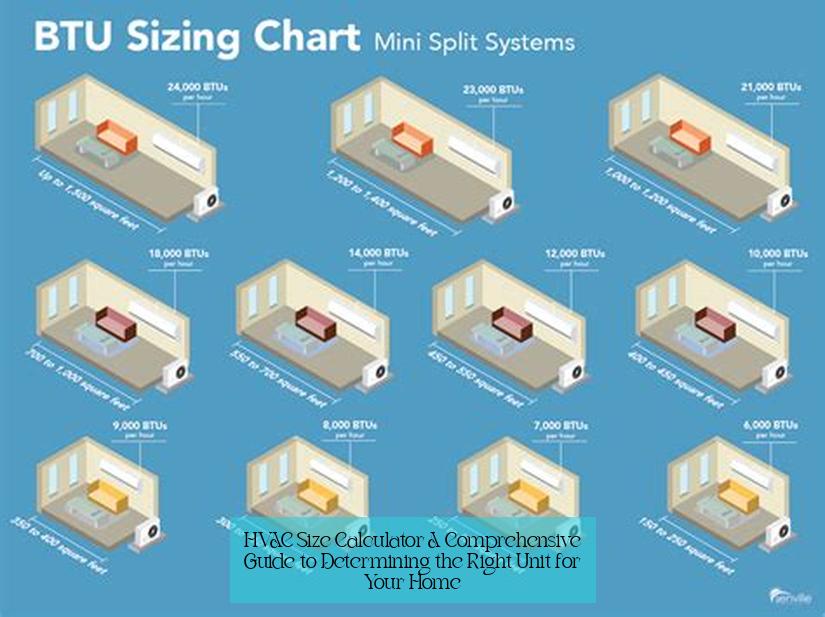Are you tired of playing the guessing game when it comes to finding the right HVAC unit for your home? Say goodbye to the uncertainty and welcome to our comprehensive guide on HVAC Size Calculator. Understanding the basics of HVAC sizing and using step-by-step calculators can make all the difference in keeping your home comfortable. Stick around as we break it down for you and help you make an informed decision that’s just the right fit.
Key Takeaways
- To calculate HVAC size, multiply the square footage of your home by 25 to get the base BTU measurement, then adjust for ceiling height and other factors.
- For a 2000 sq ft house, a central AC unit of around 3 tons or 36,000 BTU is typically needed.
- A 2.5 ton AC unit can cool a space ranging from 1201 to 1500 square feet, according to the HVAC sizing chart.
- A good rule of thumb for HVAC sizing is approximately 20 BTU for every square foot of floor area, but other factors like ceiling height and number of windows and doors should also be considered.
- There are various free and easy-to-use HVAC size calculators available online to help determine the appropriate BTU and tonnage for your air conditioning unit.
- Factors such as insulation, room size, and other conditions can be taken into account using BTU calculators to estimate the cooling or heating needs of a space.
HVAC Size Calculator: A Comprehensive Guide to Determining the Right Unit for Your Home

When it comes to ensuring a comfortable indoor environment, having the right HVAC system is crucial. An appropriately sized HVAC unit can effectively regulate temperature, improve air quality, and reduce energy consumption. However, determining the correct size for your home can be a daunting task. This comprehensive guide will provide you with a detailed understanding of HVAC size calculators and how to use them to find the perfect unit for your needs.
Understanding HVAC Sizing: The Basics
The size of an HVAC unit is measured in British Thermal Units (BTUs) or tons. A BTU represents the amount of heat energy required to raise the temperature of one pound of water by one degree Fahrenheit. Tons, on the other hand, are larger units of measurement, with one ton equaling 12,000 BTUs.
To determine the appropriate HVAC size for your home, several factors need to be considered, including:
- Square footage: The size of your home is the primary determinant of HVAC size. Generally, larger homes require larger units.
- Ceiling height: High ceilings require more powerful units to circulate air effectively.
- Number of windows and doors: Windows and doors allow heat to escape, so homes with more of these openings need larger units.
- Insulation: Well-insulated homes require less heating and cooling, so smaller units may suffice.
- Climate: Homes in warmer climates require larger units to handle the increased cooling load.
Using HVAC Size Calculators: A Step-by-Step Guide

There are numerous free and easy-to-use HVAC size calculators available online. These calculators simplify the process of determining the appropriate unit size by taking into account the factors mentioned above.
Step 1: Gather necessary information. Before using an HVAC size calculator, gather information about your home, including its square footage, ceiling height, number of windows and doors, insulation levels, and climate zone.
Step 2: Choose a reliable calculator. Several reputable HVAC size calculators are available online. Choose one that is well-reviewed and provides accurate results.
Step 3: Input your information. Enter the information you gathered in Step 1 into the calculator. Most calculators require you to select your home’s location, square footage, ceiling height, and other relevant factors.
Step 4: Get your results. The calculator will generate an estimate of the appropriate HVAC size for your home. This estimate will typically be expressed in BTUs or tons.
More related > Ultimate Central AC Size Chart: Your Guide to Choosing the Right Unit for Your Home
Interpreting Your Results: Making an Informed Decision
Once you have the results from the HVAC size calculator, it’s important to interpret them correctly. Here are some key considerations:
Trending Now — Unlocking Affordability: The Ultimate 2.5 Times the Rent Calculator Guide for Renters and Landlords
- Consider your comfort level. The calculator’s estimate may not always align perfectly with your desired comfort level. If you prefer a cooler or warmer home, you may need to adjust the size accordingly.
- Think about future needs. If you plan to add on to your home or make other changes that will affect its heating and cooling needs, factor those into your decision.
- Consult a professional. If you have any doubts about the accuracy of the calculator’s results or need personalized advice, it’s best to consult with an HVAC professional.
Conclusion
Choosing the right HVAC unit size is crucial for ensuring a comfortable and energy-efficient indoor environment. By understanding the basics of HVAC sizing and using the information in this guide, you can confidently use HVAC size calculators to determine the perfect unit for your home. Remember, if you have any doubts or require personalized advice, don’t hesitate to consult with a qualified HVAC professional.
How do I calculate HVAC size?
To calculate HVAC size, multiply the square footage of your home by 25 to get the base BTU measurement, then adjust for ceiling height and other factors.
How big of an HVAC unit do I need for a 2000 sq ft house?
For a 2000 sq ft house, a central AC unit of around 3 tons or 36,000 BTU is typically needed.
How many square feet will a 2.5 ton AC cool?
A 2.5 ton AC unit can cool a space ranging from 1201 to 1500 square feet, according to the HVAC sizing chart.










